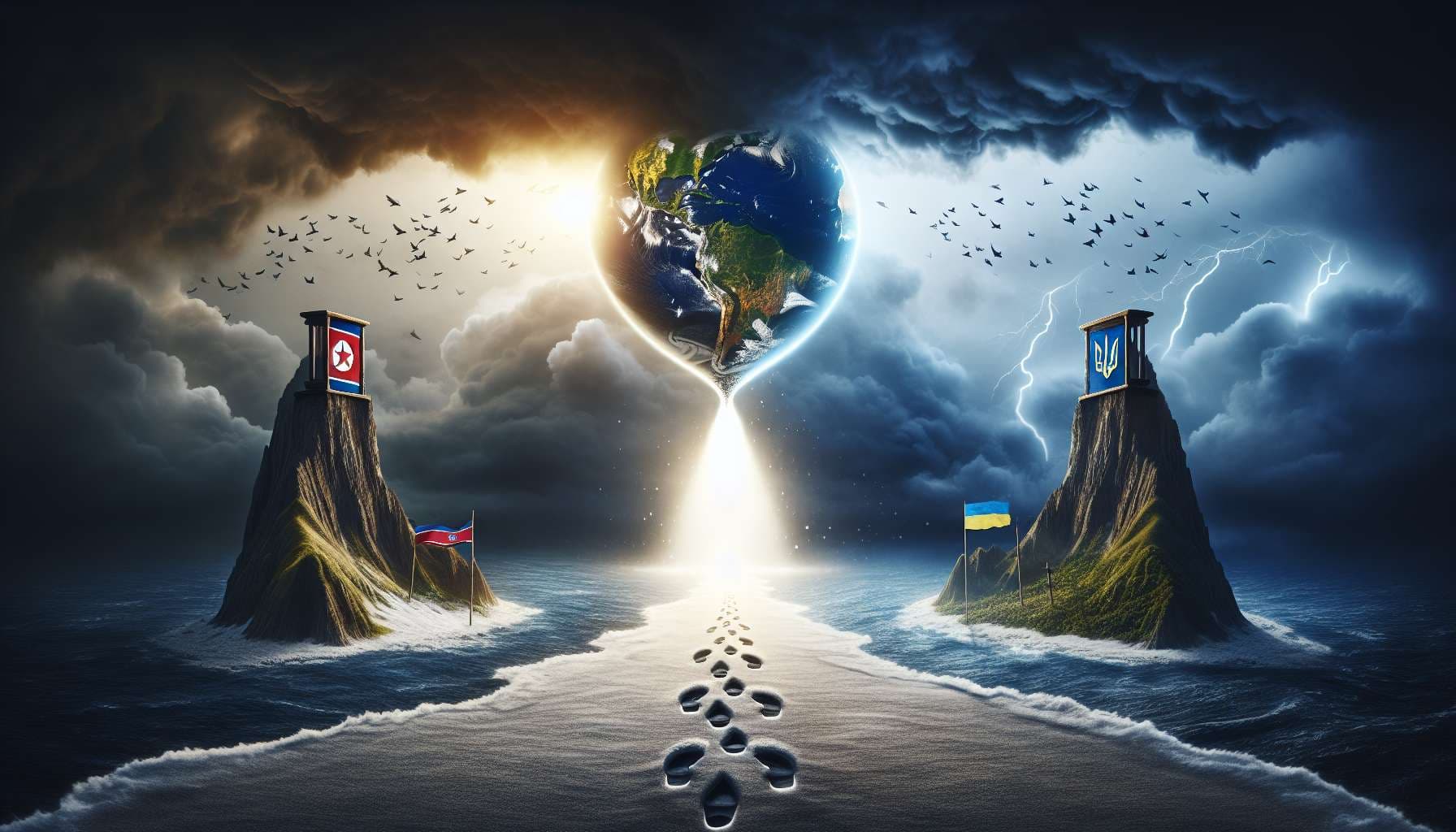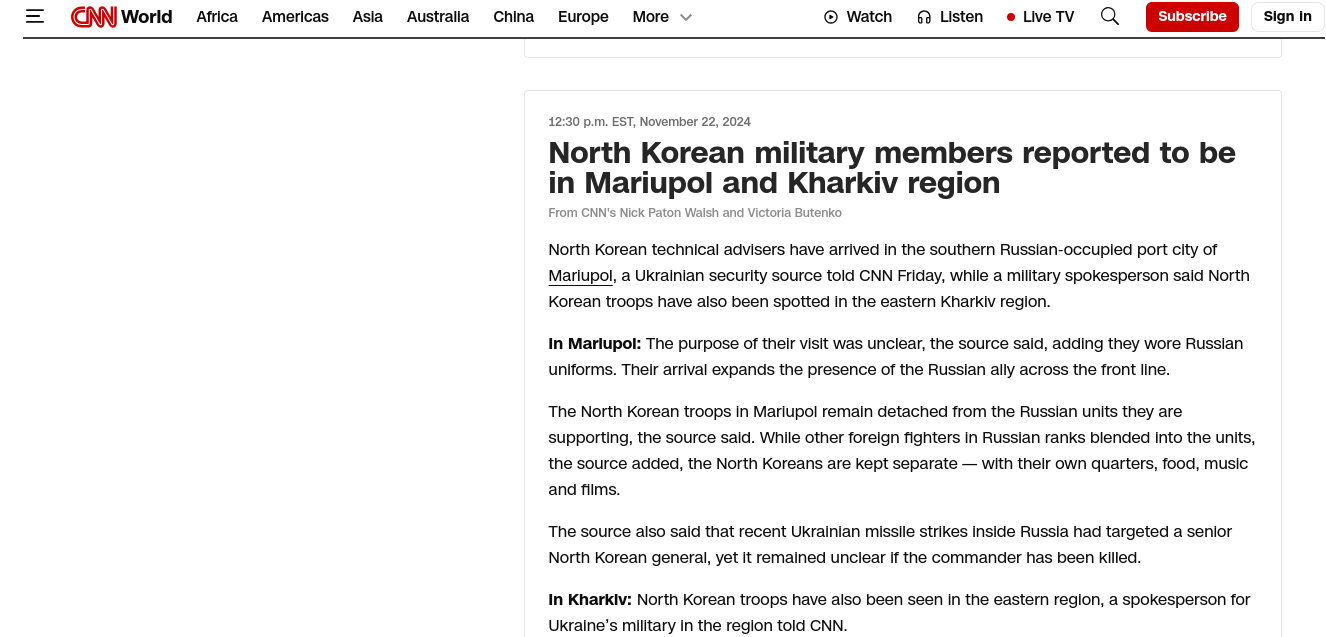
Will North Korea provide troops to help Russia with their battle against Ukraine? With least one contingent of over 100 troops, where they are physically within the borders of Ukraine's map before the February 2022 invasion.
🏅 Top traders
| # | Trader | Total profit |
|---|---|---|
| 1 | Ṁ55,498 | |
| 2 | Ṁ8,412 | |
| 3 | Ṁ7,946 | |
| 4 | Ṁ6,497 | |
| 5 | Ṁ4,337 |
People are also trading
@RandomNamedptf Resolves as NO. There is ample evidence of North Korean troops in Russia (Kursk) but none suggesting their presence in Ukraine. It also doesn’t make much sense, as sending North Korean troops to Ukraine would essentially amount to declaring war on Ukraine with all its potential repercussions. In contrast, the presence of North Korean troops in Russia can arguably be seen as aiding in the defense of its own internationally recognized territory.
Still no evidence of this occurring, Metaculus prediction now at 9% (yes the resolution criteria are identical). You can see comments on there from a Ukrainian national who has some nice insights into the situation and reporting:
https://www.metaculus.com/questions/29901/will-north-korea-send-troops-to-ukraine-before-2025/
Kim Jong-un 'furious with Vladimir Putin' over important factor in Ukraine war
Story by Rudi Kinsella & Jamie Shapiro
The source claimed: "Despite assurances of eternal friendship and full support for Russia in the war against Ukraine, Kim Jong-un does not plan to increase the amount of aid provided in the near future."
Metaculus has remained below 20% on this question, FYI (and, yes, the resolution criteria are identical):
https://www.metaculus.com/questions/29901/will-north-korea-send-troops-to-ukraine-before-2025/
@HristoSpirov none of the posted sources have given a number in Mariupol, please link that if you find it
From ISW:
Ukrainian military officials denied claims of North Korean personnel's presence in Kharkiv Oblast amid new unconfirmed reports that North Korean "technical advisers" are operating in occupied Mariupol. CNN, citing an anonymous Ukrainian security source reported on November 22 that North Korean technical advisers have arrived in Russian-occupied Mariupol, are performing support operations, and are detached from the Russian military units despite wearing Russian military uniforms. Ukrainian military officials also reportedly told CNN that radio intercepts suggest that North Korean troops are operating in Kharkiv Oblast and that North Korean troops are waiting for worsening weather conditions to conduct assault operations.[7] The Ukrainian Kharkiv Group of Forces denied reports of the presence of North Korean personnel in Kharkiv Oblast and stated that the spokesperson cited in the CNN report is not an official Kharkiv Group of Forces spokesperson and commented on the situation outside of their responsibilities.[8] Reuters reported on November 23 that a large number of the 11,000 North Korean troops in Kursk Oblast are still finishing military training.[9]
Mariupol is in Donetsk oblast, not Kharkiv, so no source from Ukraine has denied that North Koreans are there.
Reuters reported on November 23 that a large number of the 11,000 North Korean troops in Kursk Oblast are still finishing military training.
ISW has made an error here. Reuters did not report this as fact, it reported it as an unverified claim from a Ukrainian source.
From the Reuters article cited by ISW:
The source at the Ukrainian General Staff source reiterated that about 11,000 North Korean troops had arrived in the Kursk region in support of Russia, but that the bulk of their forces was still finalising their training.
The Russian Defence Ministry did not immediately respond to a Reuters request for comment. Reuters could not independently verify the figures or descriptions given.
@tedks But Mariupol is clearly outside of the territory that Russia controlled before Feb 2022, as it's outside DPR/LPR territory
@spiderduckpig Yes, Mariupol is certainly within bounds and if there is confirmation there are over 100 deployed North Korean advisors there this should be resolved to true.
@tedks Presence of O(dozens) of North Korean officers confirmed in Mariupol, with training facilities under construction https://youtu.be/oRbsTM4W930?si=iIn1iEZTcd-cLMb1
12:30 p.m. EST, November 22, 2024
North Korean military members reported to be in Mariupol and Kharkiv region
From CNN's Nick Paton Walsh and Victoria Butenko
North Korean technical advisers have arrived in the southern Russian-occupied port city of Mariupol, a Ukrainian security source told CNN Friday, while a military spokesperson said North Korean troops have also been spotted in the eastern Kharkiv region.
In Mariupol: The purpose of their visit was unclear, the source said, adding they wore Russian uniforms. Their arrival expands the presence of the Russian ally across the front line.
The North Korean troops in Mariupol remain detached from the Russian units they are supporting, the source said. While other foreign fighters in Russian ranks blended into the units, the source added, the North Koreans are kept separate — with their own quarters, food, music and films.
The source also said that recent Ukrainian missile strikes inside Russia had targeted a senior North Korean general, yet it remained unclear if the commander has been killed.
In Kharkiv: North Korean troops have also been seen in the eastern region, a spokesperson for Ukraine’s military in the region told CNN.
“I can confirm to you that, according to radio intercepts, North Korean units have been spotted in the Kharkiv region,” Yevhen Romanov, a spokesperson for a union of military units in Kharkiv told CNN.
Another Ukrainian military official also reported that North Korean troops are “already” in Kharkiv.
“I see that they are dividing into units, strengthening their combat units, and accumulating small numbers (of forces) on the front line,” Nazariy Kishak, commander of a consolidated unit of the 153rd Separate Mechanized Brigade, told Ukrainian media, adding, “They are waiting for worse weather, because for the enemy, this is the best time to start assault operations.”
Remember: An estimated 11,000 North Korean troops have been deployed to Russia’s Kursk region, where Ukraine holds territory after a surprise counteroffensive in the summer.
Ukrainian media on NK troops in Kharkiv:
Ukranian political analyst on NK troops narrative:
https://x.com/simpatico771/status/1860395565835518200?t=vqeVrKColo59vCwAIiZC9w&s=19
The first high-quality photo of a liquidated North Korean DPRK soldier. According to WPD, so unreliable:
https://watchpeopledie.tv/h/slavshit/post/248403/the-first-highquality-photo-of-a

